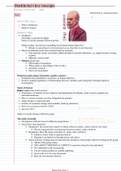Summary
Summary Sociology (SOCL1014A) University First Year Summaries.
- Course
- Institution
These summaries are simplified lecture and some reading notes. They included visual stimulus and color to keep your attention on the topics at hand. They are set up in an easy way to understand. They included key concepts such as: Establishing Sociology as a discipline, Social facts, The study of s...
[Show more]



